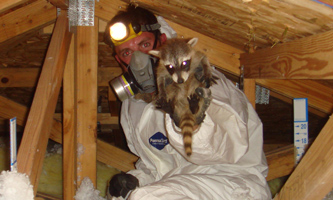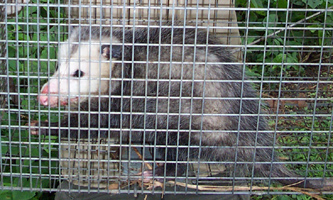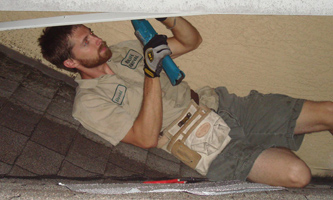Myrtle Beach Wildlife Control Services
We Provide a Full Range of South Carolina Wildlife Removal Services
What problems do wildlife cause?
Most of the calls we get are because homeowners hear animals scurrying around inside the attic or walls. Most of the damage inside a houes or attic is unseen. Rodents like squirrels, mice, and rats often chew on electrical wires.
Wildlife such as raccoons, bats, birds, opossums, and rats spread several diseases that humans can and do catch, such as Histoplasmosis, Salmonella, Leptospirosis and more. Many critters leave droppings and urine in an attic or cause mold or odor problems.
We also handle animals outside the house. It could be a critter that has dug a large hole next to your house, or a raccoon in your garbage cans, an opossum that is stealing pet food, or a skunk living under your deck, causing an odor problem. Some animals destroy your garden or landscaping. Or perhaps you are simply scared of snakes. Whatever
the problem is, our wildlife experts can remove the source of the problem, and prevent it from happening again. We are not a Myrtle Beach extermination company, nor pest control. We are dedicated Myrtle Beach wildlife control experts.
Myrtle Beach Raccoon Removal - Raccoons commonly live in the attic, where they cause damage. They can also cause many problems outside.
Myrtle Beach Rat Extermination - We solve rat and mouse problems PERMANENTLY, by finding and sealing shut any and all rat entry holes.
Myrtle Beach Bat Control - We have a 100% success rate safely removing South Carolina bats from buildings, and we guarantee our work.
Myrtle Beach Squirrel and Rodent Removal - For any critter, such as squirrels in the attic, we remove them, repair damage, & clean.
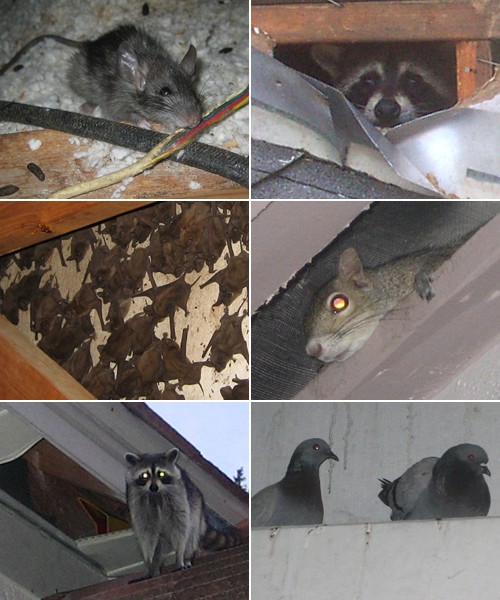
Why is our company the best?
We believe we are Myrtle Beach's best. We do a complete job, from start to finish. We remove wildlife humanely and effectively. When we encounter animals inside a house, we inspect every part of the house, from ground to roof, to identify all the areas of entry, and we perform professional repairs, with guarantee. We inspect inside the attic to find any damage, and provide full cleaning services. We offer attic restoration, permanent rodent control, bat colony exclusion, bird prevention, snake removal, dead animal removal and odor control, and more. We are fully South Carolina licensed and insured, and ready to solve your Myrtle Beach critter problem. Call us any time for a phone consulation and price quote, at 843-491-4866.
Myrtle Beach wildlife removal - article of the month
About rats
The most famous representatives of these rodents are brown rat (Rattusnorvegicus),
black rat (Rattusrattus), the domestic house mouse (Musmusculus), field mouse
(Apodemus Aquarius), field vole Myrtle Beach raccoon removal (Microtusarvails), hamster (Cricetuscricetus),
the ground squirrel (Citelluscitellus), mole rat (SPALAX typhlus), mole (Talpaeuropaea).
Domestic rat ( RattusRattus) is normally bound to search for living territory near humans.
Because of their special instinct for survival and searching for food, domestic rats are
capable of going to great lengths to invade a Myrtle Beach raccoon removal household. A unique feature of rats is that,
unless being amongst most intelligent animals, they are capable of crawl in through most Myrtle Beach snake removal tin of spaces to get to location they want.
Body length
Gray rats can grow from 40.5 to 47.5 inches including the Myrtle Beach snake removal tail. Adult females weight is from 400 to 500,
and males of 500 to 700 grams. In the case of litter weight is 4.5 to 5.9 grams, and after 100 days is 200 to 280 grams.
Initial hairiness in rat babies is usually observed after two to three days, and Myrtle Beach rat control incisors appear after eight to ten days
when they develop the distinct ability to swim. The eyes are opened after 10 to 17 days. The body temperature of an
adult rat is 37.5 to 38.8 degrees. The female is sexually mature in three, a male for four months. The number of
litters is usually eight to nine per year while the number of babies in a litter can be up to 23 (average 9-12).
Female carries for 21 days, and Myrtle Beach rat control breastfeeding last about 28 days. In case that female rat dies, other rate
takes care of her youngsters who are still breastfeeding.
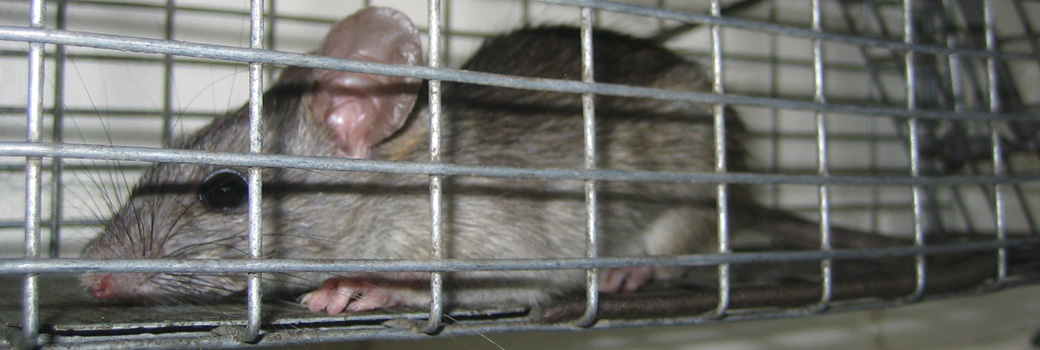
One pair of rats can, theoretically, per year, produce up to15000 Myrtle Beach bat removal babies. An adult rat daily eats
about 70 grams of food. Its teeth can grow annually up to 14 centimeters and, therefore, has a
constant need for Milling to keep them spending. In 7 days, rats can go up to 80 kilometers, from the
city, and can also jump a meter in height. For six hours, the Myrtle Beach bat removal female can be mated 200 males. They live
in the community, forms packs and are mostly active during the night. The lifespan of the rats starts
at three and a maximum of seven years.
These data indicate a very dangerous pest with which it is not easy to sustain.
Grey rat is a very intelligent animal, so when it takes food, it usually tries a small amount. If
it determines that the food is unsafe, it will not eat it. For this reason, prepared bait, if it
contains poison, must have a delayed effect for at least few days. Necrosis takes between three and
six days, and no later than nine days. Poisoned bait should be set into smaller portions - from 150 to
250 grams, in the hidden places inaccessible to other animals. Setting baits is repeated until the rodents
are successfully eliminated. Howeverm the risk of other animal species dying of rat poison is very hihgh.
Often, birds land onto the set trap and eat the baid. In terms of percentage, ober 90% of birds that
come in contact with rat poison die.
In terms of determining the number of rats present in one teritory, the unwritten rule is:
if you see one rat is assumed that there are more of them in the Myrtle Beach rodent extermination neighboring area.
In case that you see two rats, then there are about 100. If you can see three of them then about
1000, and if we see four individuals in one place, then there are a very large number.
Rats as pets
Since rats are natural amongst most intelligent Myrtle Beach rodent extermination animals. It is capable of forming an emotional
relationship with people, and since it’s naturally bound to live near humans, it’s no surprise
that it can make a good pet.
As pets, rats are usually kept in cages with wheels set up inside them, for rats to play.
Often, for devoted owners, a popular toy for their pet is also a rat labyrinth.
Rats in science
Popularly called lab-rats, these animals are often used in scientific research, because of their high
intelligence. Lab rats participate in various scientific research. They have, over decades, contributed
to numerous research results, Myrtle Beach bird control medication and procedures being validated.
Other Myrtle Beach animal pest control topics:
Should I Poison a Skunk
What Diseases do Opossums Carry
Do Bats Make Good Pets
Do You Have Rats on Your Roof
What Diseases do Armadillos Carry?
Are Coyotes Dangerous to Cats, Dogs, or Other Pets?
Protecting your dogs from coyotes
• First keep a tight guard while the dog is outside: This is an important step when ensuring security
of your dog. Never let your dog outside when you are not near it.
• Keep the dogs food and water inside: Pets’ food might attract these predators. Make sure that while the
dog is feeding, it’s on the inside. Otherwise the dog may lose its life when feeding outside.
• Do not chain your dog while it is outside: Never keep your dog chained when it is outside. While chained
a South Carolina coyote may easily attack and kill it.
• Never let a coyote play with your dog: You should not let your dog play with a coyote just because they
seem happy doing so. The coyote might be luring your dog and may soon end its life.
Are you having a problem with unwanted wildlife venturing onto your property? We specialize
not only in removing unwanted wildlife but the steps to prevent them from making your
property their next home. Wildlife critters leave behind dangerous bacterias
in their droppings which can cause your pets and even your family to get extremely ill. So give us a
call 24/7 so we can help keep you and your family safe!
We service the greater Myrtle Beach area in addition to the following cities: North Myrtle Beach,
Loris, Shallotte, Oak Island, Forestbrook, Pawleys Island, Surfside Beach, Dimery Settlement,
Bucksport, Conway, Georgetown,
Socastee, and Garden City Beach. We also
service the following counties: Cherokee County, Colleton County, Richland County, Berkeley County,
Greenwood County, Lexington County, Charleston County, Anderson County, Aiken County, Barnwell County,
and Dorchester County.
We are ready to solve your Myrtle Beach wildlife removal issue!
Call 24/7 to discuss your wildlife problem and get a price quote.
Call us any time at 843-491-4866 - We look forward to solving your wildlife problem!

